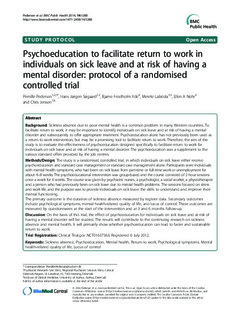| dc.contributor.author | Pedersen, Pernille | |
| dc.contributor.author | Søgaard, Hans Jørgen | |
| dc.contributor.author | Yde, Bjarne Frostholm | |
| dc.contributor.author | Labriola, Merete | |
| dc.contributor.author | Nohr, Ellen A | |
| dc.contributor.author | Jensen, Chris | |
| dc.date.accessioned | 2015-09-11T12:39:31Z | |
| dc.date.accessioned | 2015-09-30T08:54:45Z | |
| dc.date.available | 2015-09-11T12:39:31Z | |
| dc.date.available | 2015-09-30T08:54:45Z | |
| dc.date.issued | 2014 | |
| dc.identifier.citation | BMC Public Health 2014, 14(1) | nb_NO |
| dc.identifier.issn | 1471-2458 | |
| dc.identifier.uri | http://hdl.handle.net/11250/1117122 | |
| dc.description.abstract | Background: Sickness absence due to poor mental health is a common problem in many Western countries. To
facilitate return to work, it may be important to identify individuals on sick leave and at risk of having a mental
disorder and subsequently to offer appropriate treatment. Psychoeducation alone has not previously been used as
a return to work intervention, but may be a promising tool to facilitate return to work. Therefore, the aim of the
study is to evaluate the effectiveness of psychoeducation designed specifically to facilitate return to work for
individuals on sick leave and at risk of having a mental disorder. The psychoeducation was a supplement to the
various standard offers provided by the job centres.
Methods/Design: The study is a randomised controlled trial, in which individuals on sick leave either receive
psychoeducation and standard case management or standard case management alone. Participants were individuals
with mental health symptoms, who had been on sick leave from part-time or full-time work or unemployment for
about 4–8 weeks. The psychoeducational intervention was group-based and the course consisted of 2 hour sessions
once a week for 6 weeks. The course was given by psychiatric nurses, a psychologist, a social worker, a physiotherapist
and a person who had previously been on sick leave due to mental health problems. The sessions focused on stress
and work life, and the purpose was to provide individuals on sick leave the skills to understand and improve their
mental functioning.
The primary outcome is the duration of sickness absence measured by register data. Secondary outcomes
include psychological symptoms, mental health-related quality of life, and locus of control. These outcomes are
measured by questionnaires at the start of the intervention and at 3 and 6 months follow-up.
Discussion: On the basis of this trial, the effect of psychoeducation for individuals on sick leave and at risk of
having a mental disorder will be studied. The results will contribute to the continuing research on sickness
absence and mental health. It will primarily show whether psychoeducation can lead to faster and sustainable
return to work. | nb_NO |
| dc.language.iso | eng | nb_NO |
| dc.publisher | BioMed Central | nb_NO |
| dc.title | Psychoeducation to facilitate return to work in individuals on sick leave and at risk of having a mental disorder: Protocol of a randomised controlled trial | nb_NO |
| dc.type | Journal article | nb_NO |
| dc.type | Peer reviewed | en_GB |
| dc.date.updated | 2015-09-11T12:39:31Z | |
| dc.source.volume | 14 | nb_NO |
| dc.source.journal | BMC Public Health | nb_NO |
| dc.source.issue | 1 | nb_NO |
| dc.identifier.doi | 10.1186/1471-2458-14-1288 | |
| dc.identifier.cristin | 1253588 | |
| dc.description.localcode | © 2014 Pedersen et al.; licensee BioMed Central. This is an Open Access article distributed under the terms of the Creative Commons Attribution License (http://creativecommons.org/licenses/by/4.0), which permits unrestricted use, distribution, and reproduction in any medium, provided the original work is properly credited. The Creative Commons Public Domain Dedication waiver (http://creativecommons.org/publicdomain/zero/1.0/) applies to the data made available in this article, unless otherwise stated. | nb_NO |
